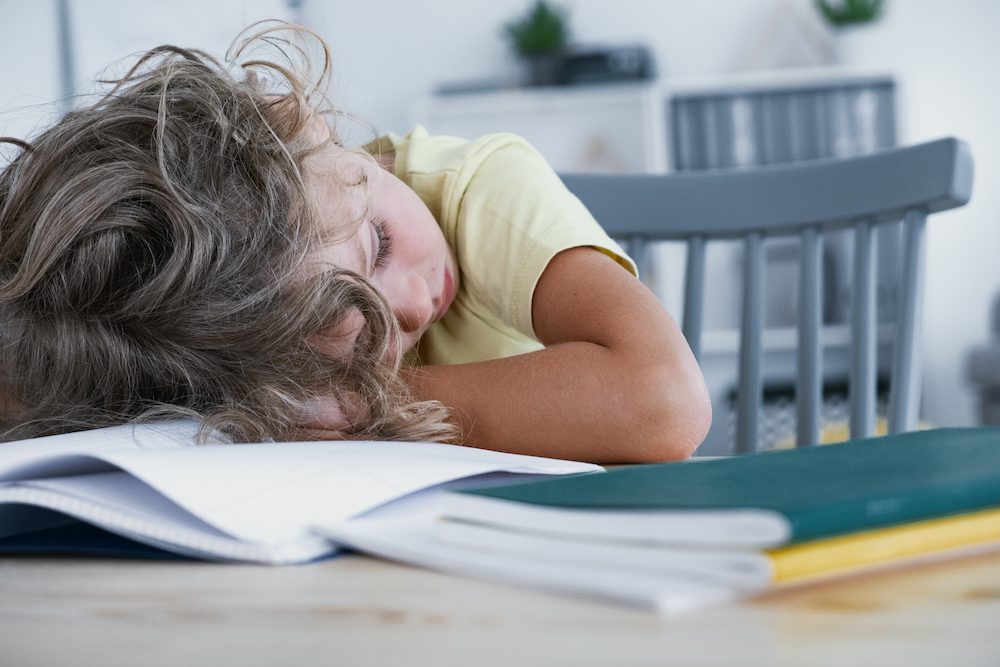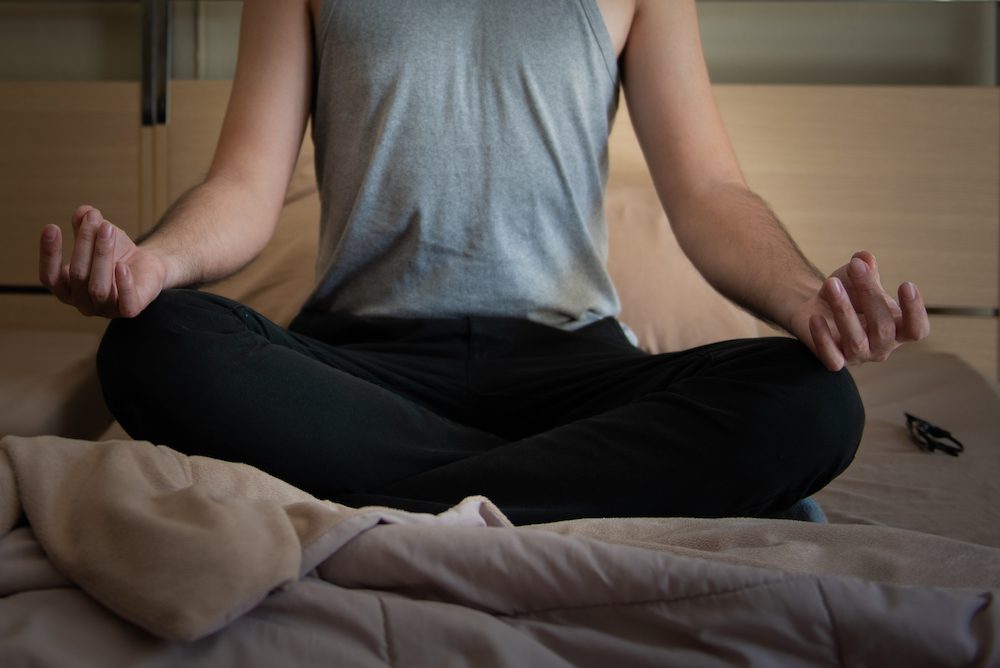Anxiety is a normal response to fear or stress that everyone experiences from time to time. An anxiety disorder, however, is when those feelings of nervousness or panic persist for a longer period of time and interfere with daily life. Anxiety disorders are the most common of any mental health condition, impacting about 18% of American adults every year.
Sleep problems and anxiety tend to occur simultaneously, with research indicating that most people with anxiety disorders experience symptoms of insomnia. It is thought that their relationship is bidirectional — that is, they can each impact each other. Anxiety can lead to racing thoughts that keep you awake, and that subsequent lack of sleep can make the symptoms of anxiety worse. Fortunately, there are a number of treatment options that can alleviate symptoms of anxiety and insomnia. In many cases, treating anxiety can improve symptoms of insomnia and vice versa.
What Is Anxiety?
Anxiety is a feeling of worry, uneasiness, or panic. It may appear naturally in times of stress, such as leading up to a work presentation, school exam, significant life event, or public performance. In these cases, anxiety is a normal, healthy reaction to stressors. In fact, humans have evolved to experience some level of anxiety when threatened.
Temporary anxiety may even help you effectively confront stressors by increasing energy and focus. However, anxiety that persists and interferes with your personal and professional life may be a sign of an anxiety disorder.
Anxiety Disorder Symptoms
Anxiety disorders can cause symptoms that affect the mind and body, and in some cases significantly impact a person’s quality of life. While anxiety can present itself in a number of different ways, certain symptoms are more common across all types of anxiety disorders.
- Persistent Feelings of Uneasiness: Anxiety may induce feelings of distress, restlessness, or panic. Sometimes, the severity of anxiety is disproportionate with the event that caused it. If anxious feelings grow and linger over many weeks, months, or years, it may be a sign of an anxiety disorder.
- Physical Discomfort: People with anxiety disorders may experience sudden, and sometimes unprovoked, physical symptoms. Increased heart rate, dizziness, and shortness of breath can be signs of anxiety. In some cases, severe chest pain occurs and may be alarming. These symptoms are also associated with other health conditions, so it’s important to visit a health care provider for an evaluation.
- Behavioral Changes: An anxiety disorder may cause a person to avoid normal daily activities or professional and social obligations that could trigger distress or panic. It is also common for people with anxiety disorders to also have symptoms of depression.
Types of Anxiety Disorders
There are many types of anxiety disorders and each has its own characteristics and diagnostic criteria. A health care provider may perform a physical exam, review a person’s health history, and discuss current symptoms to determine whether an anxiety disorder is the cause. A referral to a mental health professional may also be part of the diagnostic process. Anxiety disorders affect nearly 1 in 5 adults in the United States each year, though some anxiety disorders are more common than others.
- Generalized Anxiety Disorder (GAD): Those with GAD commonly worry about daily issues even when there is no cause for alarm. They tend to remain in a state of uneasiness, anticipating catastrophes relating to their families, professional lives, well-being, or money.
- Panic Disorder: This condition causes sudden feelings of intense fear, despite no immediate threat. People with this disorder often experience panic attacks, which may include symptoms like increased heart rate, dizziness, numbness, loss of control, and chest pains.
- Phobia-Related Disorders: Phobias are powerful, irrational fears of typically non-threatening events or things. Individuals may experience specific phobias of things like tight spaces, social engagements, heights, and blood.
- Social Anxiety Disorder: People who experience this disorder have nearly constant feelings of fear of judgment from others, along with persistent worry of embarrassment.
The Anxiety-Sleep Loss Cycle
High stress levels can disrupt healthy sleep patterns by preventing a person from falling and remaining asleep. People with anxiety appear to be even more sensitive to sleep problems because they tend to be more sleep reactive. In other words, their sleep is more likely to be interrupted by stress. One study also suggests that people who are sleep reactive are at risk of developing anxiety, creating a loop of sleep-related stress.
The cause and effect between anxiety and sleep is bidirectional. Anxiety can lead to rumination and racing thoughts, especially before bed when you’re less distracted by daily responsibilities. In turn, if you’re not sleeping well, you may experience anxiety directly related to your lack of sleep. This sort of sleep anxiety can result in lying in bed trying to force yourself to go to sleep. The result is often more sleep loss — and another vicious cycle.
Sleep is a crucial element for overall health and well-being, a time when the brain and body can restore themselves. Lack of sleep may exacerbate symptoms of anxiety and make it harder to confront and process stressful situations.
Both anxiety and insomnia can be effectively managed with appropriate therapy under the guidance of a health care provider. For some people, treating one condition may offer relief from the other.
Can Sleep Disorders Cause Anxiety?
There is a connection between sleep disorders and anxiety, though researchers are still trying to better understand the nature of this relationship. Learning about these connections may help you better understand how your sleep challenges impact your anxiety.
- Insomnia: Lack of sleep can exacerbate anxiety symptoms, and there’s evidence that insomnia can lead to developing anxiety.
- Sleep Apnea: Sleep apnea interrupts sleep and has been associated with a higher risk of developing mental health conditions like anxiety.
- Narcolepsy: Some studies show that more than half of people with narcolepsy also have anxiety disorders like panic disorders or social anxiety.
Specific causes for anxiety disorders remain unclear, and it likely involves a complex mix of factors relating to brain chemistry, stress, environmental influences, and genetics.
Tips for Calming Anxiety and Sleeping Better
Fortunately, there are plenty of available techniques to help with anxiety and sleep loss. The American Psychological Association reports that anxiety disorders are “very treatable,” with individuals often reducing or eliminating effects of these conditions after several months of treatment. When managing chronic sleep disorders and anxiety, it’s critical to work with a health care professional who can take a complete view of your symptoms to make an accurate, specific diagnosis and come up with a comprehensive treatment plan.
Some of the following tips can help you manage sleep issues and anxiety. For medical intervention and therapy, make sure to reach out to your doctor.
Cognitive Behavior Therapy
Cognitive behavior therapy (CBT) involves meeting with a mental health professional, who guides you in recognizing and altering negative thinking in order to change behaviors. It can be a very effective way to retrain your brain and find relief from anxiety. CBT-I, a form of CBT used specifically to treat individuals with insomnia, can also improve insomnia symptoms.
Practice Relaxation Techniques
Relaxation techniques can improve both anxiety and sleep. Test out different techniques — such as deep breathing, mindful meditation, or tensing and then relaxing different muscle groups — at different times during the day to see what helps. There is evidence that breathing exercises can reduce stress and lower cortisol levels and blood pressure. Additionally, incorporating meditation to your bedtime routine can help calm your brain for sleep.
Exercise
Even infrequent moderate physical exercise can help with symptoms of anxiety, and regular exercise has also been shown to reduce anxiety symptoms long-term. Not only that, exercise can help you sleep better. Anything from aerobics to strength training to yoga can help. Though, it’s best to avoid exercising within 60 to 90 minutes of bedtime.
Improve Sleep Hygiene
Sleep hygiene is a set of habits that can improve your sleep. For example, setting a consistent bedtime routine with regular grooming rituals can help you relax and prepare for sleep. Other considerations include avoiding stimulants like caffeine and nicotine late in the day, which can negatively affect both sleep and feelings of anxiety. Creating a relaxing bedroom environment can also reduce stress and improve sleep quality. Try low lighting or using certain scents, like lavender oil.
Medication
You and your doctor may decide that medication is the best way to treat your anxiety. Some antidepressants can worsen sleep issues, while others can improve sleep. It’s crucial to bring up any sleep concerns with your doctor so that you can find a medication that works best for you.
When to Talk to Your Doctor
Working with a medical professional to improve your anxiety and related sleep issues can be helpful, especially if your symptoms begin to interfere with your daily life and lifestyle changes have not provided relief. There are a variety of professionals who can help you.
- Primary Care Physician: PCPs are typically the first line of contact for any health condition. They can prescribe medications but may refer you to a specialist or therapist to help with specific symptoms relating to anxiety and sleep.
- Sleep Specialist: These medical professionals work in sleep centers and may concentrate on specific sleep disorders, such as insomnia, narcolepsy, or sleep apnea. Sleep specialists can guide individuals through several types of sleep studies to diagnose their sleep conditions.
- Therapist: Individuals seeking CBT for either their anxiety or sleep issues can look to therapists for help. A therapist can help you identify anxiety roots and triggers and then guide you through gradually changing your thoughts and behavior.
- Psychiatrist: Psychiatrists are medical doctors who specialize in mental health. They can diagnose mental health conditions, like anxiety disorders, and prescribe medicine as treatment.
References
Ask the Sleep Doctor
Have questions about sleep? Submit them here! We use your questions to help us decide topics for articles, videos, and newsletters. We try to answer as many questions as possible. You can also send us an email. Please note, we cannot provide specific medical advice, and always recommend you contact your doctor for any medical matters.



